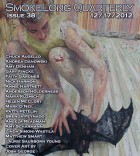Language and rhythm in your story “The Speed of the Sound” carry the reader along to the end in much the same way as poetry does. How did this story evolve for you? Did it begin more prosaic or was it the language itself that provided the lyrical impetus?
Yes, language and rhythm are important to me, but they’re not the starting place. I start with an image or situation that has resonance for me, and the task of writing becomes finding out why. It’s just a matter of building the associative context that surrounds the image so that (hopefully) the simple thing—two people watching a storm—carries its own complete reality. Sometimes the building of this context moves more like a story than other times. That’s not a big concern for me.
The lyricism is the result of a love of the sound of language in motion and a slow, recursive writing process. It has to sound right. It has to sound right in relation to what comes before and what comes after. I read slowly, too; I sound out every word in my head. I’m still scared of long novels for this reason.
You describe your process as “a matter of building the associative context.” This is a wonderful distillation of process and the genesis of stories. It sounds so logical. What do you do when that “associative context” is elusive?
In that case I would return (in my head) to the point of origin. Is the original fixation as rich as I thought? How far is the image from wholeness? But I’m risking making the process sound more orderly and logical than it is. I don’t actually ask myself these questions; they’re more felt as tensions. I rarely sit down to write without having something in my head, something that has been there for a while, rolling around in the earth with sprigs and burrs sticking to it, waiting for me to talk it into sitting still so I can get a good look.
I’m relieved it isn’t always “orderly and logical!” You mentioned a possible novel. What lessons have you learned about the craft of writing from your experience with short stories?
I’m still intimidated by long novels because I’m such a slow reader. I’m not working on a novel, or, I should say, it’s complicated. I’m quoting someone here from a writing conference years ago, and I think this person is Antonya Nelson, and she said that whether one writes in longer or shorter forms is really a matter of disposition. The impression I received from this is that you are primarily one or the other. Of course there are problems with thinking this way, but I have experienced some truth in the assessment. I’m working on a body of little things that share the same questions and doubts about the world. I’ve been calling it a body of work, not because the terms are important to me, but because it seems that those who want to discuss genre generally want to defend boundaries.
What writers inspire you whether they write long or short?
I tend to read more in depth and less in width. I will often forego reading something I “should” in order to read something I love a second (or third or fourth) time. In no particular order, here are some writers I find myself consistently returning to: Lynda Hull, Carol Muske, Jo Ann Beard, Bachelard, James Baldwin, Marilynne Robinson, Clarice Lispector, Wanda Coleman and W.G. Sebald.
What advice would you give a writer who has just begun to think seriously about writing?
Advice part one would be to be careful about advice. I mean this mainly in terms of how one conceives of strengths and weaknesses and direction; be careful to whom you grant the authority to speculate about these things. Advice part two is related, and it is to know yourself, or know yourself more. I don’t know what writing is, but I think it has something to do with recording a relationship between a self and the world. Know what you love and what you fear and what you despise and try to figure out why. Literature and other arts do far more than provide one with examples of formal options, which I find is often how the conversation is framed. Writing and art you respond to reflect versions of yourself back to you, so give them that opportunity. And listen.



 Included in the price of SmokeLong Fitness:
Included in the price of SmokeLong Fitness: